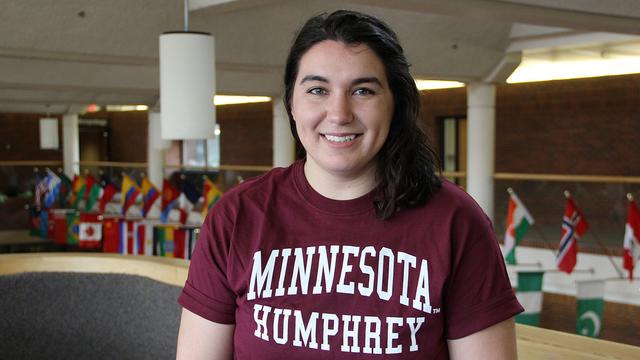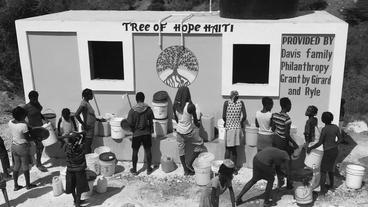Humphrey School student Michele Girard is a changemaker—literally. Girard, who is finishing up her first year in the Master of Development Practice program, has been working for the past five years to provide a reliable and convenient water supply for a small city in Haiti.
In 2015, when Girard was an undergraduate at the University of Maine, she received a $10,000 grant from the Davis Foundation to build a water system in Grand-Goâve, Haiti, in partnership with a nongovernmental organization (NGO) called Tree of Hope Haiti.
Now, Girard is taking the next step by developing a plan to make sure the water system is financially sustainable; so that Tree of Hope can raise money to pay for ongoing maintenance and repairs.
Girard spent the past year developing that project as a fellow in the University of Minnesota’s Acara Changemakers Lab. Her work was so impressive that it was recognized as the top graduate-level winner of the 2019 Acara Challenge, which awards students who have fresh ideas for how to solve the world’s biggest challenges. Girard will receive a $5,500 grant and ongoing support from expert faculty members as she aims to launch her project.
Water Access is a Challenge
In many areas of Haiti, getting access to water can be difficult and expensive, Girard says.
“In some places, NGOs provide water to residents. Residents can get water from traveling water tankers, but they have to pay the government for it,” says Girard. Others use open water sources that are unmonitored.
Then there are communities like Grand-Goâve, which install their own water systems but then can’t keep them going because they can’t afford to pay for maintenance, repairs, and replacement parts.
Girard says that’s a problem that Tree of Hope faces with its water system, which is now four years old. It serves 250-400 people and pumps about 2,000 gallons of groundwater per day.
Girard says as more people learn about the water system, the more usage it gets and the more wear and tear on the mechanical components. She estimates it costs about $1,400 per year for maintenance and upkeep.
“So I started thinking about how you could make the system sustainable, so that if other funding sources weren’t coming in you could still cover a portion of those annual costs,” Girard says.
She came up with two options for Tree of Hope to consider: Setting up a community garden, which would sell produce to local residents; and starting a water delivery service, where individuals would pay to have water dropped off at points near their homes.
'The Humphrey Way'
Girard will return to Haiti in August for the next steps in the process, including surveying people who use the water system and organizing community discussions so residents can decide how they want to proceed.
“So that the majority of people making the decisions are members of the community. That’s the Humphrey way,” Girard says. “If I were to go there and say, ‘You should definitely do this,’ that’s not the Humphrey way. That’s not what my professors have taught me.”
Whatever option the community decides to pursue, Girard says she hopes to “get some traction” on it by early next year.
One of the reasons Girard won the Acara Challenge is because “she is so thoughtful about how to work within the local community,” says Megan Voorhees, co-director of Acara, an interdisciplinary leadership program for undergraduate and graduate students that gives them the tools and skills to address grand challenges facing our world.
The second- and third-place graduate-level winners of the Acara Challenge are also Humphrey School students. Girard credits the Acara program and the Humphrey School with creating an environment where students feel encouraged to pursue ambitious projects.
“One of the most rewarding things for me is being in class and learning tangible skills like statistics, how to do interviews, and applying those skills right away. I’m on the phone with people in Haiti like an hour later,” Girard says. “Having professors telling you that you can go out into the world and do these projects—if I had been in a less supportive environment, I wouldn’t have had the confidence to do this. I think the Humphrey School does a great job of preparing students to do this type of work.”



